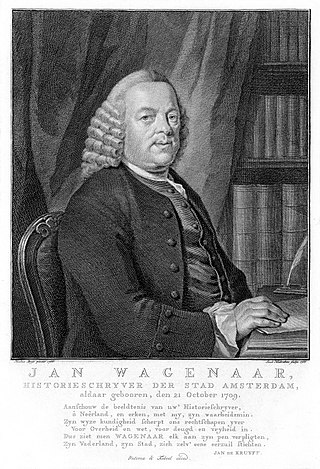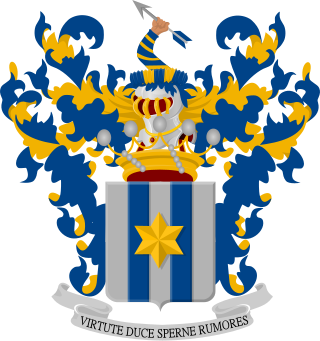Related Research Articles

The Battle of Zwartewaal was a decisive naval battle during the Hook and Cod wars.

Peperga is a small village in Weststellingwerf in the province Friesland of the Netherlands. As of 2017, it has a population of 85 people, living in approximately 35 houses, and is characterized by detached houses, several businesses and a church. Peperga is located on the A32 between Wolvega and Steenwijk, with public transportation offering a service to the nearby villages of Steggerda and De Blesse.

Johan Kievit (1627–1692) was an Orangist Rotterdam Regent, who may have been one of the instigators of the murder of former Grand Pensionary Johan de Witt, of the Dutch Republic, and his brother Cornelis de Witt on 20 August 1672, together with his brother-in-law, Cornelis Tromp.
Johan van Banchem was one of the leaders of the lynching of Johan de Witt and Cornelis de Witt on August 20, 1672. He was rewarded for this crime with an appointment as baljuw of The Hague by Stadtholder William III. After a few years in this function he was arrested and convicted for gross abuse of his office. He was sentenced to death on November 26, 1680 by the Hof van Holland, but appealed the verdict to the Hoge Raad van Holland en Zeeland. He died in jail before this appeal was finished.
De Witt is the name of an old Dutch patrician and regenten family. Originally from Dordrecht, the genealogy of the family begins with Jan de Witte, a patrician who lived around 1295. The family have played an important role during the Dutch Golden Age. They were at the centre of Dordrecht and Holland oligarchy from the end of the 16th century until 1672, and belonged to the Dutch States Party.

Jan Wagenaar was a Dutch historian, best known for his contributions to Tegenwoordige staat van nederland and Vaderlandsche Historie.

The Hof van Holland, Zeeland en West-Friesland was the High Court of the provinces of Holland, West Friesland and Zeeland, instituted as a separate entity of the government of the Counties of Holland and Zeeland in 1428, under the Burgundian and Habsburg Netherlands, and continued with little change under the Dutch Republic, Batavian Republic, and the Kingdom of Holland, until its dissolution in 1811 by the First French Empire. It should not be confused with the Hoge Raad van Holland en Zeeland which was the supreme court, founded in 1582 by the States-General of the Netherlands and intended for the entire Dutch Republic. The Hof was in practice the main Appellate court in Holland and Zeeland, and in number of cases-handled the most important in the entire Dutch Republic and its Precedents played an important role in the development of Roman-Dutch law, which is still influential in Southern Africa.

Allart Pieter van Jongestall, also spelled Allard Pieter van Jongestal was a Dutch jurist and diplomat. He was president of the Hof van Friesland and represented the States-General of the Dutch Republic in the negotiations of the Treaty of Westminster (1654) and the Treaty of Breda (1667) which ended the first two Anglo-Dutch Wars.

The Exposition des primitifs flamands à Bruges was an art exhibition of paintings by the so-called Flemish Primitives held in the Provinciaal Hof in Bruges between 15 June and 5 October 1902.

The Loevestein faction or the Loevesteiners were a Dutch States Party in the second half of the 17th century in the County of Holland, the dominant province of the Dutch Republic. It claimed to be the party of "true freedom" against the stadtholderate of the House of Orange-Nassau, and sought to establish a purely republican form of government in the Northern Netherlands.

Jhr. Christaan Diederik Emerens Johan Bangeman Huygens was a Dutch diplomat and civil servant, from 1825 to 1832 Minister Plenipotentiary of the Kingdom of the Netherlands in Washington, DC.

Elie Luzac was a Dutch jurist, journalist, writer of philosophical, historical and political literature, and book-seller, who was considered an important ideologue of the "democratic wing" of the Orangist movement, both after the Orangist restoration in the Dutch Republic in 1748, and during the Patriottentijd.

Estella Dorothea Salomea Hijmans-Hertzveld was a Dutch poet, translator, and activist. From a young age, her poems, mainly on Biblical and historical themes, appeared regularly in respectable literary journals. Frequently, her work also addressed contemporary social issues, including the abolition of slavery, Jewish emancipation, and opposition to war. A collection of her best-known poems, entitled Gedichten ('Poems'), was published several weeks before her death in 1881.
Barthout van Assendelft was a Dutch Grand Pensionary.
Jan Bouwensz, also known as Jan Boudynsz and Jan Baldewini was a Dutch Landsadvocaat.
Frans Coebel van Loo, Heer of Loo, also known as François Coebel was a Dutch politician and Grand Pensionary of Holland.

Adriaen van der Goes was a Dutch Grand pensionary. He was the son of Grand pensionary of Holland Aert van der Goes, and he succeeded his father in this position.

The Cod Alliance Treaty was a 1350 or 1351 treaty by which a number of nobles and cities allied with William V of Holland against his mother Margaret II, Countess of Hainaut and her allies. It was signed in the first phase of the Hook and Cod wars.

The Battle of Veere was a small naval battle that took place in late May 1351 during the Hook and Cod wars.
Jan van Doesborch, also known as Jan van Doesborgh, John of Doesborch or John of Doesborowe, was a Dutch author, bookseller, printer, engraver, publisher and translator. During the course of his career as a printer and bookseller during the period roughly between 1502 and 1532, he published around sixty books in various genres, including works of prose fiction, medieval legend, practical handbooks, and colonial travelogues. These books were mainly printed in either Dutch or English.
References
- 1 2 Oebele Vries (1999). De Heeren van den Raede biografieën en groepsportret van de raadsheren van het Hof van Friesland, 1499-1811. H. Gartmann, W. Vermandel, en J. W. Smit. p. 223. ISBN 9065500766.
- ↑ Jan Wagenaar (1770). Vaderlandsche historie vervattende de geschiedenissen der nu vereenigde Nederlanden inzonderheid die van Holland · Volume 21. H. Gartmann, W. Vermandel, en J. W. Smit. p. 6.
- 1 2 Jan Wagenaar (1797). Byvoegsels en aanmerkingen voor het ... Vaderlandsche historie van Jan Wagenaar, door H. van Wyn, N.C. Lambrechtsen, en anderen . Byvoegsels ... bestaande in noodige naleezingen Volume 1. University of California Press. p. 218.
- ↑ James D. Tracy (2021). A Financial Revolution in the Habsburg Netherlands Renten and Renteniers in the County of Holland, 1515-1565. University of California Press. p. 120. ISBN 9780520367258.